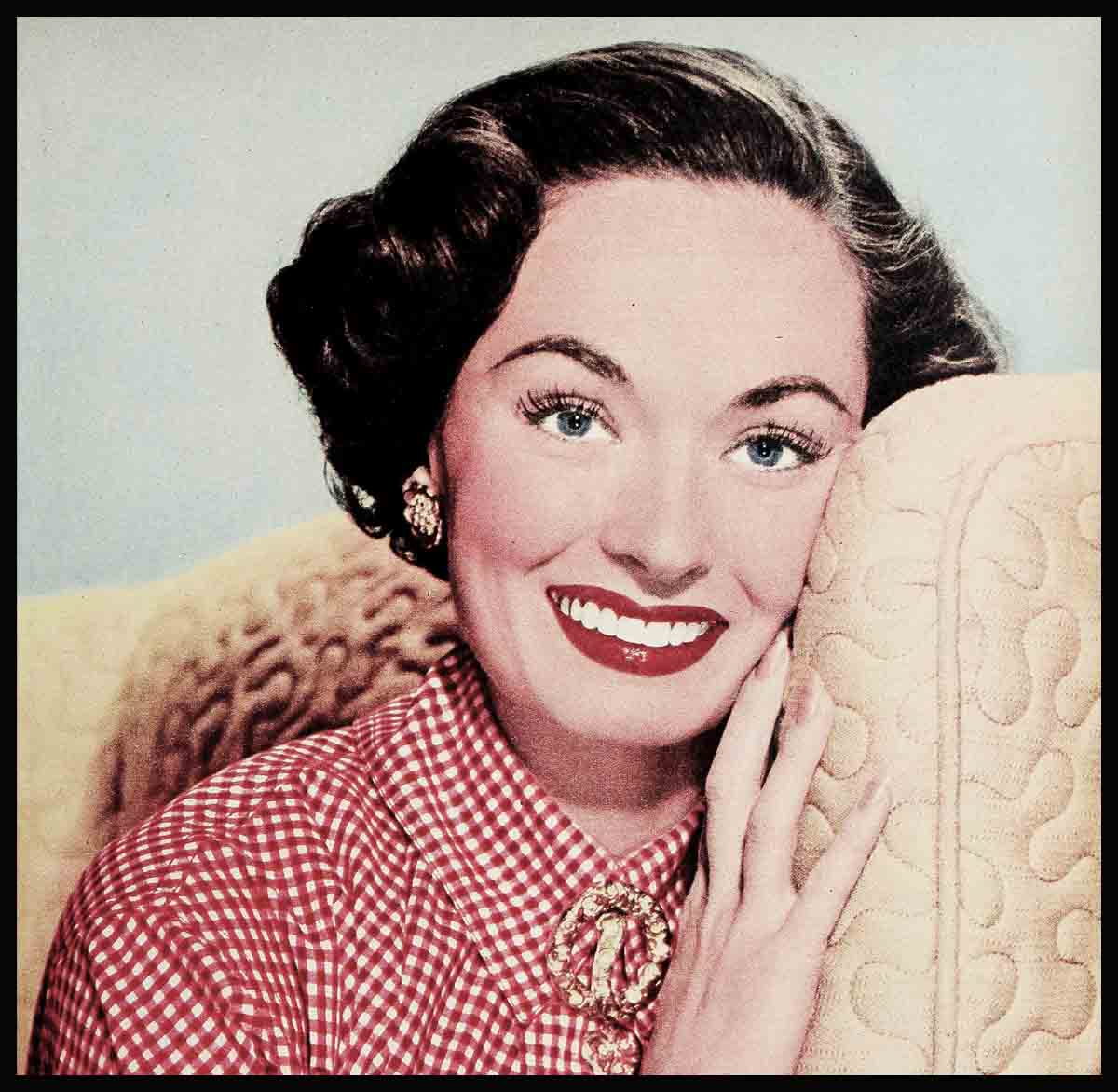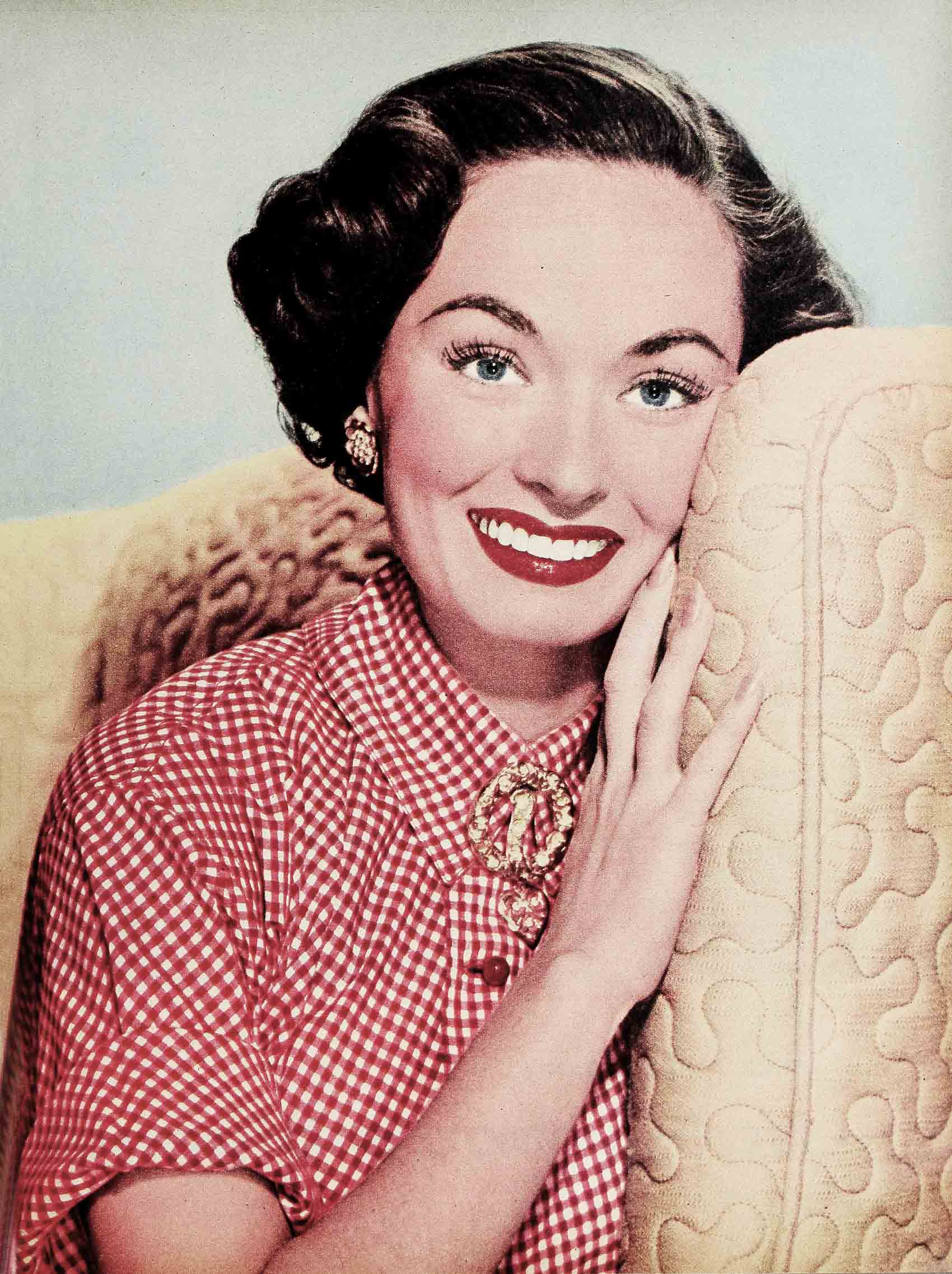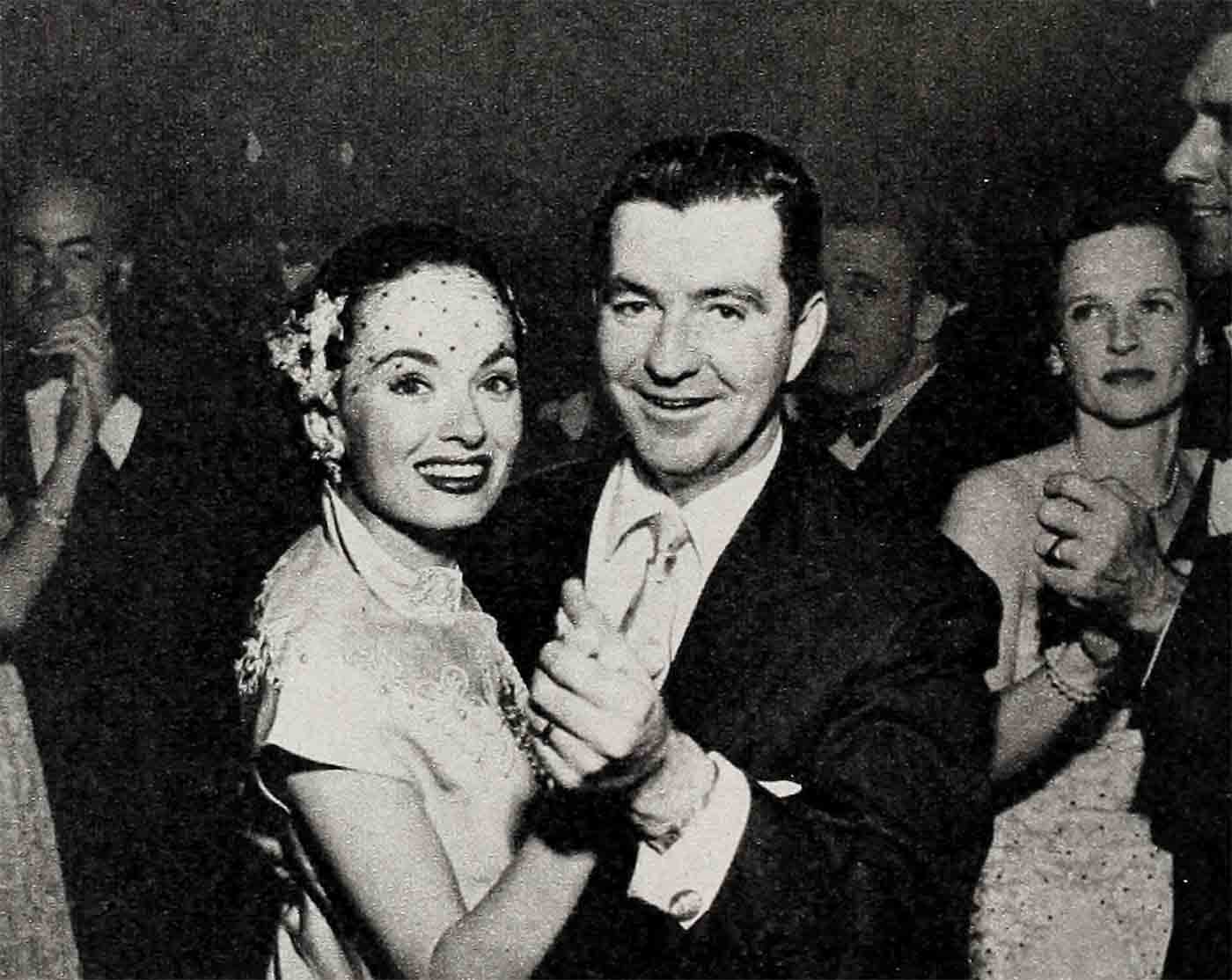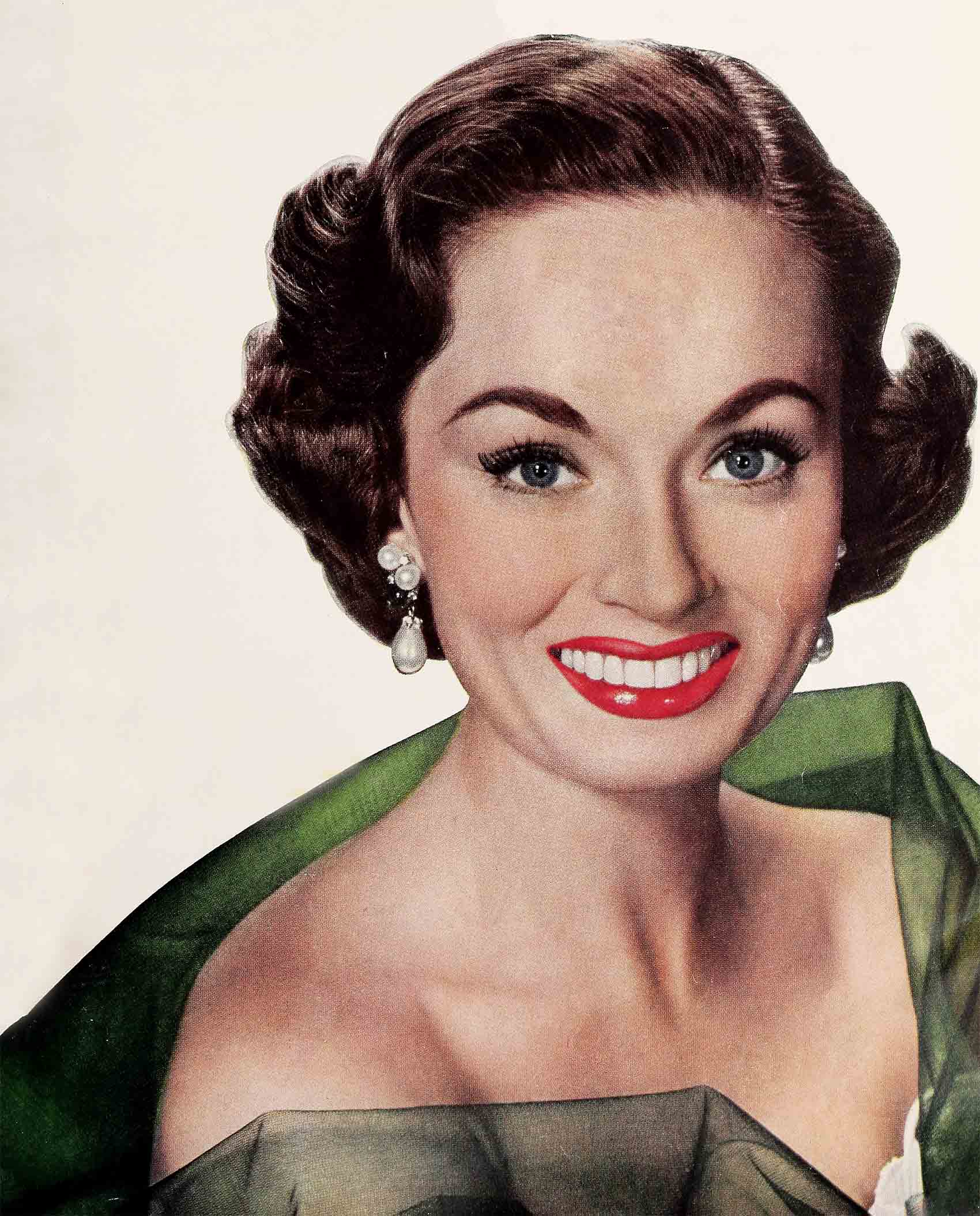
So Nice To Come Home To—Ann Blyth & Dr. James V. McNulty
“When you open the front door of Ann Blyth’s home,” a friend of hers said, “you know you are going to be welcomed by it, not impressed. It’s a lovely place with lots of beautiful things in it, but none of the sort that hit you in the face.”
The friend thought for a moment, and then continued. “Come to think of it, Ann’s marriage is like her home,” she declared. “The happiness is quietly, deeply there; just as Ann planned. Nobody makes loud declarations of love, they just live it.”
No bulletins are issued by Ann about her personal life, nor, for that matter, do any items about it usually find their way into the gossip columns. But neither are there secrets; ask Ann about herself and her Dr. Jim. She’ll be glad to tell you.
She was at MGM getting ready for The King’s Thief, her first picture since the birth of her son, when someone reminded her that during her engagement she had been heard to say that her love for Jim could get no greater. “Were you right about that?” she was asked. “Hasn’t marriage made a difference?”
“No, I was wrong, and marriage has made a difference,” Ann replied, laughing. “That’s the marvel of it! I love him more—more every day than the day before. I thought back then my love couldn’t grow, and I think now it can’t, but it did and it does.”
Nice reports about Hollywood couples often keep going until they get back to the persons they are about; Ann is always pleased pink to hear about herself and her Dr. Jim, but she always corrects the impression that her marital happiness has come to her exactly as she planned it.
“Plans imply a carefully drawn picture of the future in which there is an unwillingness to have the picture changed,” she says. “It’s almost like asking for trouble to be so scrupulously demanding. I didn’t have plans—I dared to have hopes. And they have materialized and it is most wonderful!”
How wonderful is wonderful? Well, in Ann’s case it has dispelled all doubts in her mind as to her place in the world; first and foremost she is a wife and mother. Then she is an actress. “If Jim were to ask me to stay home and be just a wife I wouldn’t hesitate a second about it,” she has said. “The greatest part of my life is in my home. But the marvel is, of course, that he would never ask. He has said, ‘It would be just as ridiculous for me to ask that as for you to ask that I give up my profession!’ ”

Incidentally, not only are Ann and Jim reluctant to interfere with each other in such matters, they have already agreed that their little Timothy is going to make his own decisions about his life work. One night, talking to Jim, Ann happened to remark how nice it would be if Timmy decided to become a doctor like his father. “But of course I’m not saying he should!” she explained hurriedly. “I mean, maybe he’ll be a doctor if he wants to be. It’s farthest from my mind that he should be this or be that because we want it that way.”
“Right!” said Jim. He smiled at his wife. “What do we really want him to be, before anything else?”
“Happy!” replied Ann.
They both think Timmy has a good beginning towards such a future, because he is already showing what Ann terms a “strong streak of normalcy.” She saw first evidence of this last July 4 when he was baptized, she reports. “I guess it’s almost a tradition that a baby will cry at such a time,” she says. “Timmy, who was three weeks old that day, cried all through the ceremony at St. Charles, but just when the moment of the final blessing came—he fell fast asleep.”
Since her marriage Ann has met a number of doctors’ wives and has acquired their attitudes toward social affairs. They don’t plan ahead very much and when they do they give everyone lots of notice. At one party, to which twelve physicians and their wives were invited, only two of the men were unable to attend because of emergency calls, Ann recalled. “The important thing to me was that Dr. James V. McNulty was present,” she said. “We lucky girls all felt sorry for the two wives left alone, but we also enjoyed ourselves, because in this business you have to take your gains. with your losses!”

Ann thought they’d never get to the last such affair she and Jim were invited to. He not only came home late from the hospital, but he had been up for a day and a half without sleep. She had already thought of phoning their hostess to make their excuses, but, as she puts it, “You can never depend on Jim’s tiredness. He has amazing recuperative power, something he developed in his interne days, perhaps, when he was always on call. A shower and, at the most, a half-hour snooze, and he is ready to start out all over again.” Many doctors have this facility.
Of course this doesn’t make for a systematic life, and a lot of Ann’s friends, remembering how orderly she always was about her life, have wondered how well she would do, married to a doctor whose patients, by medical protocol, outrank his wife in claims on his time.
There are nights when she starts out with a husband in the home and finishes up alone with a book, because he has been called away. Last Thanksgiving they dined at the home of Ann’s Aunt Cis and Uncle Pat, and no sooner was the meal over than Jim had to answer an emergency summons to the hospital. He barely had time to drive her and the baby home. There have been dinners which Ann has cooked herself and had ready to serve by seven, which he eventually got home to eat about midnight. Yes, Ann was disappointed, but she wouldn’t change things for the world.
“He does come home,” she says—and says with fond recall. “Once it was nearly two days, but he came home. And when he does, when he and little Timmy and I are together again, all the waiting is like nothing and our happiness is complete.”
Jim has a sister and three brothers, including Dennis Day. All are married and they have eighteen children among them. Since family gatherings come often, and Ann loves them, she never has to fear being alone for too long. Sometimes, in her status as the newest of the wives, she gets teased about missing Jim when he is away. “With so many husbands and wives in the family, who’s to notice if one or two aren’t around?” somebody will ask. And everybody will laugh twice as hard because Ann, who has a fine sense of humor ordinarily, can never quite accept this gag as funny.
But it was Ann, not Jim, who was first to be absent from home because of work. Right after their honeymoon she had to leave for the Sierras on a ten-day location trip. “It was the longest ten days of my life,” she sighed.

One great change has softened the impact of career interference in the lives of the James McNultys. Though the doctor may be called away on sudden notice, there remains with Ann their young Timothy Patrick McNulty, who is the image of his father. Lest anyone get the wrong impression about how a doctor’s baby is brought up, let it be said here that Timmy is being brought up according to old fashioned precepts of love and attention rather than by scientific regimen. The other day when he tried to sit up, and instead fell to one side and bumped himself, it was his mother who handled the emergency, with special soothing treatment, while the doctor just sat by and watched like any other father. But of course that’s the way Doctor Jim wants it to be, too.
Ann had expected that she might get some technical counsel from Jim about raising little Timmy, but it seems that Jim doesn’t want a scientifically raised son; he apparently wants one who just grows, and whom he can bounce around and enjoy as is. Ann has bought most of the books on infant care and child psychology, but now she merely refers to them to learn what might be expected of Timothy as he grows, rather than as a guide on how to raise him.
Jim’s contribution to all this, when he comes home, consists mostly of swinging Timothy high in the air and holding him there to his great glee. Ann always tries to be around at these moments, because she is certain only her presence prevents Jim from throwing the baby in the air instead of just lifting him.
“He’s simply a father around Timmy, not a doctor.” Ann says. “When he gets in of an evening and I report something like, say, Timothy’s refusal to take his bottle, and want to know why he won’t take it, Jim will just say something like, ‘Well, he doesn’t want it!” And here I’ve been waiting all day for the expert to handle the crisis! Of course he’s right—and it proves to be as simple as that. Timmy just didn’t want his bottle that meal. Next meal he gobbles it all down.”
Not long ago Timmy was vaccinated and had a fretful time afterward with his sore arm. Ann took sole charge of the case and Jim was content to get his reports on Timmy secondhand from her. Soon afterward, Ann, too, was getting her reports about Timmy secondhand; she started work at the studio.
By exerting strong control over herself she didn’t phone home to talk to the nurse in charge of Timmy as often as she wanted to—she kept it down to three times a day! Then each evening she would get reports—very complete reports, too. According to some people who heard them, these were more like complete reenactments of Timmy’s activities from morning to night, while Ann kept murmuring, “Oh! I missed him so all day!”
In one way Jim did combine physician’s role with husband’s as far as Ann was concerned. There isn’t a person who has worked with Ann who hasn’t marveled at the way she has snapped back to her old measurements. “It’s almost impossible to believe that she is a mother,” declared Helen Rose, studio designer, a few weeks ago. “She still has the smallest waist of any star in the studio!”
This didn’t happen by itself, of course. Ann has worked at it. She planned to do it all along but several days after Timothy’s birth when Ann was lying in bed and merely contemplating exercising as a vague project for the future, Jim showed up and made things a little more immediate than that.
“Pretty soon now,” he began, stressing now, “you’ll be able to do some exercises that I think you’ll enjoy doing, and they will be so good for you.”
“His words were all I needed,” Ann says. “I started right then.”
Her only reason for thinking there was no need to hurry was that she knew herself to be a very slim person and that mere weight reduction never would be a problem, because eating wasn’t. But what she gathered from Jim’s words was that to a young mother not only weight control, but muscle recovery, was important. For that reason exercises should be kept up always.
Ann’s best time for exercises was early in the morning. It didn’t take so much time when she got up because she was already dressed for it, so to speak. If she didn’t do it then, she discovered that she found less and less time to do it as the day progressed, and by night she was too tired to do it at all.
Naturally, Timmy contributes mightily to the emotional well-being of his parents, since their concern for each other is matched only by their love for him. Each step in his development is something they must report to someone, and they have long since learned that while friends will listen with apparent interest, this interest is sometimes just a form of politeness. Their best audiences are each other. Nevertheless, even a comparative stranger can drag out just a few small facts about Timothy from Ann or Jim if he tries—or even half tries.
For instance, one day Ann arrived for an appointment at MGM in Culver City looking particularly radiant. It turned out that for the first time in his life Timothy had slept the whole night through without waking for a pre-dawn feeding. “Don’t you think that’s quite an accomplishment?” she told, rather than asked, everyone within earshot.
And that wasn’t all. There was the day Timothy revealed he had mastered the art of grasping things with his hand and manipulating them with some sort of control. Taking a firm grip on a doll (obviously not a favorite), he banged it on the side of his crib until it broke, then shifted his hold to the part of the toy which rattled—and rattled it.
Events like these are red letter ones in the lives of young parents. Everyone around the studio agrees that one of Ann’s best dramatic scenes was her story, with gestures, of the first time Timmy sat up alone. “He teetered and caught himself,” she said, and teetered herself to illustrate. “Then he tottered and caught himself,” she went on, acting it out. “Then, when he finally realized that no one was supporting him and he was sitting up all alone in bed you should have seen the look of stunned realization that came into his eyes!”
At this point in her recital Ann, living her part, had acquired that stunned look of realization herself. But she didn’t forget to add that her first move after this was to check Timothy’s feat with her infants’ development chart. She was delighted, she says, to find out that Timothy was two days ahead of normal development in his sitting up.
Of course Ann doesn’t always talk about Timmy. One bright December morning at the Metro-Goldwyn-Mayer Studios she was heard talking about the next baby she hopes to have!
“He’ll get the same care that Timmy is getting, but it will be more relaxed care,” she said. “After all, I’ve had to do my learning with Timmy, and now that I am more sure of myself it will be easier with the next one.”
She thought for a’moment and then added, “And with the little ones who come after that, too!”
Thus spoke Ann McNulty.
THE END
—BY WILLIAM BARBOUR
It is a quote. MODERN SCREEN MAGAZINE APRIL 1955




